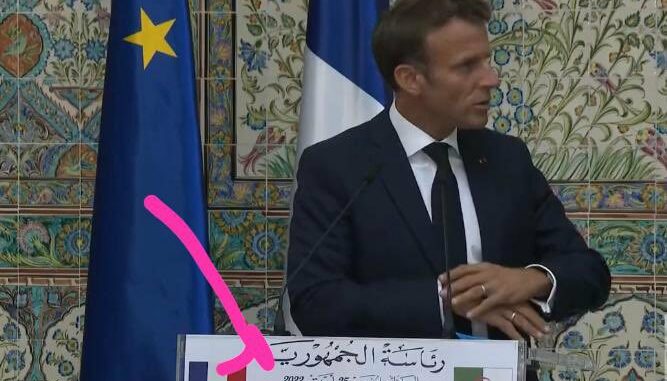
Mohammed Meslem / English Version: Med.B.
The French president, Emmanuel Macron, is trying to find a state of balance in his country’s relations with both Algeria and the Moroccan regime, which was lacking during the last two years, when the balance tilted in favor of Algeria, due to some mistakes made by the Moroccan regime that led to damage his country’s relations with Algeria. Paris, and at the top of these files is the “Pegasus” espionage scandal, which the Moroccan secret service used against the phone of the French president.
Immediately after the return of the French Minister of European and Foreign Affairs, Stephane Séjourné, from a visit to the Alaouite Kingdom, the Secretary General of his ministry, Anne-Marie Decaux, flew to Algeria at the head of an official delegation to represent her country at the eleventh session of political consultations between the two countries.
The Algerian Foreign Ministry said in a statement on its own account on the social networking site, Facebook, the night of Tuesday to Wednesday: “Today (Tuesday), the eleventh session of the Algerian-French political consultations was held in Algiers, chaired by Lounes Magramane, Secretary General of the Ministry of Foreign and National community Abroad, along with (his counterpart) Anne-Marie de Cote, Secretary General of the Ministry of European and Foreign Affairs of the French Republic.
The Foreign Ministry statement added: “This meeting, held at the Ministry’s headquarters, allowed for a comprehensive assessment of the state of relations between the two countries at the political level, as well as bilateral cooperation in all fields, including the economic field and the issue of movement of people.” International and regional issues of common interest, the Foreign Ministry said, were also on the agenda of the discussions between officials, especially the situation in the Sahel region, Mali and the Middle East, especially the situation in Palestine and the humanitarian crisis in Gaza, as well as the issue of Western Sahara.
The last meeting of the Political Dialogue Committee between Algeria and France dates back to last September 22 in the French capital, Paris, and was chaired by the Algerian side, Lounes Magramane, and his French counterpart, Anne-Marie Decot, a meeting that “witnessed an assessment of progress in the preparation of the upcoming bilateral entitlements, with a focus on priority files” in the area of bilateral cooperation.”
At the time, French-Moroccan relations were going through one of their most difficult periods, marked by repeated accusations by Moroccan political and media elites against the French president, Emmanuel Macron, of favoring Algeria at the expense of his country’s historical relations with the Moroccan regime, which for decades remained an undeclared protectorate of the French state in North Africa. This prompted the inner circle of the Alaouite palace in Rabat to attack Macron in a manner that exceeded all international boundaries and norms.
As an expression of the extent of the Moroccan anger against the French president, and immediately after the tenth session of political consultations between Algeria and Paris, an order was issued by the Alawite palace in Rabat to the newspaper “Morocco 360”, owned by the second man in the Alawite palace, who is the king’s private writer, Mohamed Mounir Majidi, by weaving a defamatory article on the private life of the French president Emmanuel Macron, setting a precedent in the relations between Rabat and Paris.
In recent weeks, however, the French president has tended to calm down the Moroccan regime, and has assigned his foreign minister, Stephane Séjourné, to visit Morocco and work to calm tensions between the two countries. Previously, the Moroccan elites had joined in cheering the imminent occurrence of a radical change in the French position on the Sahrawi issue. Similar to the Spanish position, except that Séjourné visited Rabat and returned to Paris without presenting the Moroccan regime with what it was waiting for.
Source: https://www.echoroukonline.com/france-pursues-a-balanced-policy-in-its-relations-with-the-maghreb-region
